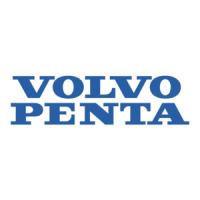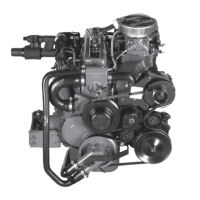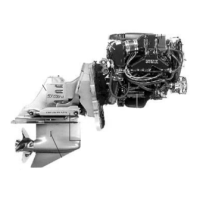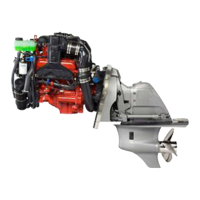Do you have a question about the Volvo Penta 3.0GLP-J and is the answer not in the manual?
Welcome message to new Volvo Penta engine owners, highlighting quality and support.
Volvo Penta's dedication to minimizing environmental impact through design and operations.
Core values of Quality, Safety, and Environmental Care that define Volvo Penta's identity.
Explains safety symbols and general precautions for operating and maintaining the engine.
Covers dangers related to fuel, sparks, and battery handling to prevent fires and explosions.
Safety precautions for working around the engine's serpentine belt and pulley system.
Essential safety rules for operating the boat, including seamanship and basic boating practices.
Information on carbon monoxide properties, sources, and risks in boat environments.
Details CO poisoning symptoms, emergency treatment, detection systems, and alarm responses.
Discusses CO risks during stationary boat operation, ventilation, and specific area precautions.
Covers CO risks during underway operation, including backdrafting, canvas, and trim angle effects.
Addresses safety related to ports, hatches, speed, altitude, and generator use.
Details on Volvo Penta's warranty coverage, booklets, and customer copy of the warranty card.
Explains the importance of the owner's card for validation of warranty and service.
Information on the 24/7 breakdown service for Volvo Penta engine owners.
Information about the worldwide network of authorized Volvo Penta dealers for service.
How to access operator's manuals, service information, and dealer locators online.
General description of common gauges and their functions on the instrument panel.
Explains the function, benefits, and operation of the power trim system.
Details the function of buttons for trimming the drive unit in and out.
Defines and explains the uses of Trim Range, Beach Range, and Tilt Range.
Describes the digital and analog instruments used to display trim status.
Identifies various control levers, buttons, and their functions for engine and drive operation.
Instructions for adjusting the friction brake on remote controls for smoother operation.
Explains the ACP system's function, installation, and indicators for corrosion prevention.
Discusses static water line importance for preventing water ingestion into the engine.
Step-by-step guide to test the static water line to ensure proper engine protection.
Essential pre-start inspections including bilge blower, ventilation, and fuel checks.
Detailed steps for starting the engine cold, including priming for GL and EFI models.
Procedures for starting the engine when it is already warm.
Instructions for clearing a flooded engine for both GL and Fuel Injected models.
Critical safety warnings for operating the boat and engine.
Guidance on interpreting gauges and responding to engine or drive alarms.
How to maneuver the boat and use the power trim/tilt system for optimal performance.
Details how to use the control lever and trim switch for adjusting the drive unit angle.
Guides on achieving optimal boat trim for performance and ride comfort.
Recommendations for cruising speed and how to disengage/engage the shift function.
Safe procedures for shifting gears and controlling speed, including warnings.
Techniques for maneuvering twin-engine boats and using the neutral interlock button.
Information on operating the steering system, including power steering and twin-engine steering.
Instructions on how to steer the boat by manipulating control levers for rotation and direction.
Explains the function, use, and importance of the emergency stop switch.
Steps to take before shutting down the engine, including tilt operation.
Correct procedure for stopping the engine and associated warnings.
Actions to take after engine shutdown, especially regarding freezing temperatures.
Step-by-step guide for flushing the engine with fresh water to maintain components.
Guidelines for trailering the boat, including tilting the drive unit and rinsing.
Instructions for draining the engine block and manifold for 3.0L engines.
Procedures for draining raw water cooled engines, including manifold and pump hoses.
Steps for draining the raw water side of closed cooling system engines.
Actions to take if the boat runs aground, including checking for damage.
Importance of checking the tie rod for damage in twin-engine setups.
Safety precautions and steps for jump-starting the engine with auxiliary batteries.
General guidance for diagnosing engine malfunctions and collecting relevant information.
Steps to troubleshoot ignition and fuel system issues when the engine cranks but doesn't start.
Diagnosing causes for rough running, engine noises, and vibrations.
Troubleshooting steps for engine overheating, stalling, and fuel/ignition loss.
Diagnosing problems with engine RPM, oil pressure, and low battery voltage.
Factors affecting engine performance, including environmental conditions and hull weight.
Explains the EPM system, its activation, and how to resolve issues.
Identifying causes and solutions for low engine oil pressure alarms and warnings.
Troubleshooting steps for overheating in both EFI and carbureted engines.
Addressing water in bellows, water in oil, and oil sensor reset procedures.
Information on the fuse and relay box layout and troubleshooting electrical circuits.
Step-by-step guide for removing and installing the SX-A propeller.
Step-by-step guide for removing and installing the DPS-A propeller.
Impact of boat bottom condition on performance and procedures for engine submersion.
Diagnosing and resolving problems related to boat steering systems.
Outlines owner's duties for maintenance and lists safety/preventative checks.
Daily and monthly checklists for owners to perform on the engine and drive unit.
Information on dealer-performed scheduled maintenance and the importance of service history.
Explains the role of the hour meter in tracking maintenance intervals.
Comprehensive list of maintenance tasks for annual service or every 100 operating hours.
Continuation of the annual service checklist for sterndrive and miscellaneous items.
Guidance on performing basic maintenance and repairs, and when to seek dealer assistance.
Emphasizes the use of genuine Volvo Penta parts and warns against non-marine alternatives.
Safety procedures before and after engine service, including fire/explosion prevention.
Safety measures for handling batteries, hot surfaces, fluids, and cooling systems.
Proper methods for washing the engine and requirements for certified engines.
Inspection and maintenance of the engine's serpentine belt for proper operation.
Information on inspecting and maintaining sacrificial anodes and heat exchanger anodes.
Importance of proper engine alignment and the need for dealer service.
Step-by-step guide for replacing the fuel screen on 3.0L carb engines.
Procedure for replacing the fuel filter on V6/V8 carbureted engines.
Guide for replacing the engine fuel filter with safety precautions.
Instructions for replacing the engine thermostat for various engine models.
How to inspect and replace the water pump impeller for optimal cooling.
Guidelines for maintaining batteries and the electrical system for reliability.
Information on spark plug maintenance and safety warnings regarding sparking.
Procedures for checking and maintaining the drive unit lubricant level and condition.
Methods for clearing debris from the pitot tube to ensure speedometer function.
Inspecting and replacing sacrificial anodes to prevent corrosion.
Guidelines for painting the drive unit and general propeller care.
Checking and maintaining the power steering fluid level for optimal steering.
Procedures and recommendations for preparing the engine and boat for long or short-term storage.
Steps for short-term storage (overnight to two months), including flushing and draining.
Detailed checklist for long-term storage (> two months), including fuel stabilizer and oil changes.
Steps to follow when launching the boat after storage to ensure readiness.
General disclaimer and introduction to engine specifications.
Detailed technical data for the 3.0GLP-J engine, including dimensions, systems, and capacities.
Technical specifications for the 4.3GL-J engine covering various systems and capacities.
Technical data for the 4.3GXi-J engine, including engine, fuel, electrical, and cooling systems.
Technical specifications for 5.0GL-J and 5.0GL-JF engines.
Technical specifications for 5.0GXi-J and 5.0GXi-JF engines.
Technical specifications for 5.7Gi300-J and 5.7Gi300-JF engines.
Technical specifications for 5.7GXi-J and 5.7GXi-JF engines.
Details on engine oil specifications and how to check the oil level correctly.
Guidance on adding oil during break-in and after, plus scheduled oil service intervals.
Information on octane ratings and general warnings for gasoline fuel systems.
Precautions and maintenance advice when using ethanol-blended fuels in gasoline engines.
Explains electronic fuel injection and detonation (spark knock) in engines.
Specifications and requirements for battery cables and the engine battery.
Details on sterndrive components and the required oil capacity for SX-A and DPS-A models.
Information on locating and identifying various engine and drive unit decals and plates.
Locating emission control information and tune-up decals on the engine.
Detailed information on the Engine Decal, Engine Plate, Transom Shield Plate, and Drive stickers.
Statement of conformity for recreational craft propulsion engines regarding emissions and sound.
Details of conformity for the 3.0 Litre engine, including emission and noise standards.
Conformity statement for the 4.3 Litre engine, listing applicable standards and directives.
Declaration of conformity for the 5.0 Litre engine, covering emissions, noise, and EMC.
Conformity statement for the 5.7 Litre engine, detailing compliance with EU directives.
Declaration of conformity for the 8.1 Litre engine, including essential requirements and standards.
Welcome message to new Volvo Penta engine owners, highlighting quality and support.
Volvo Penta's dedication to minimizing environmental impact through design and operations.
Core values of Quality, Safety, and Environmental Care that define Volvo Penta's identity.
Explains safety symbols and general precautions for operating and maintaining the engine.
Covers dangers related to fuel, sparks, and battery handling to prevent fires and explosions.
Safety precautions for working around the engine's serpentine belt and pulley system.
Essential safety rules for operating the boat, including seamanship and basic boating practices.
Information on carbon monoxide properties, sources, and risks in boat environments.
Details CO poisoning symptoms, emergency treatment, detection systems, and alarm responses.
Discusses CO risks during stationary boat operation, ventilation, and specific area precautions.
Covers CO risks during underway operation, including backdrafting, canvas, and trim angle effects.
Addresses safety related to ports, hatches, speed, altitude, and generator use.
Details on Volvo Penta's warranty coverage, booklets, and customer copy of the warranty card.
Explains the importance of the owner's card for validation of warranty and service.
Information on the 24/7 breakdown service for Volvo Penta engine owners.
Information about the worldwide network of authorized Volvo Penta dealers for service.
How to access operator's manuals, service information, and dealer locators online.
General description of common gauges and their functions on the instrument panel.
Explains the function, benefits, and operation of the power trim system.
Details the function of buttons for trimming the drive unit in and out.
Defines and explains the uses of Trim Range, Beach Range, and Tilt Range.
Describes the digital and analog instruments used to display trim status.
Identifies various control levers, buttons, and their functions for engine and drive operation.
Instructions for adjusting the friction brake on remote controls for smoother operation.
Explains the ACP system's function, installation, and indicators for corrosion prevention.
Discusses static water line importance for preventing water ingestion into the engine.
Step-by-step guide to test the static water line to ensure proper engine protection.
Essential pre-start inspections including bilge blower, ventilation, and fuel checks.
Detailed steps for starting the engine cold, including priming for GL and EFI models.
Procedures for starting the engine when it is already warm.
Instructions for clearing a flooded engine for both GL and Fuel Injected models.
Critical safety warnings for operating the boat and engine.
Guidance on interpreting gauges and responding to engine or drive alarms.
How to maneuver the boat and use the power trim/tilt system for optimal performance.
Details how to use the control lever and trim switch for adjusting the drive unit angle.
Guides on achieving optimal boat trim for performance and ride comfort.
Recommendations for cruising speed and how to disengage/engage the shift function.
Safe procedures for shifting gears and controlling speed, including warnings.
Techniques for maneuvering twin-engine boats and using the neutral interlock button.
Information on operating the steering system, including power steering and twin-engine steering.
Instructions on how to steer the boat by manipulating control levers for rotation and direction.
Explains the function, use, and importance of the emergency stop switch.
Steps to take before shutting down the engine, including tilt operation.
Correct procedure for stopping the engine and associated warnings.
Actions to take after engine shutdown, especially regarding freezing temperatures.
Step-by-step guide for flushing the engine with fresh water to maintain components.
Guidelines for trailering the boat, including tilting the drive unit and rinsing.
Instructions for draining the engine block and manifold for 3.0L engines.
Procedures for draining raw water cooled engines, including manifold and pump hoses.
Steps for draining the raw water side of closed cooling system engines.
Actions to take if the boat runs aground, including checking for damage.
Importance of checking the tie rod for damage in twin-engine setups.
Safety precautions and steps for jump-starting the engine with auxiliary batteries.
General guidance for diagnosing engine malfunctions and collecting relevant information.
Steps to troubleshoot ignition and fuel system issues when the engine cranks but doesn't start.
Diagnosing causes for rough running, engine noises, and vibrations.
Troubleshooting steps for engine overheating, stalling, and fuel/ignition loss.
Diagnosing problems with engine RPM, oil pressure, and low battery voltage.
Factors affecting engine performance, including environmental conditions and hull weight.
Explains the EPM system, its activation, and how to resolve issues.
Identifying causes and solutions for low engine oil pressure alarms and warnings.
Troubleshooting steps for overheating in both EFI and carbureted engines.
Addressing water in bellows, water in oil, and oil sensor reset procedures.
Information on the fuse and relay box layout and troubleshooting electrical circuits.
Step-by-step guide for removing and installing the SX-A propeller.
Step-by-step guide for removing and installing the DPS-A propeller.
Impact of boat bottom condition on performance and procedures for engine submersion.
Diagnosing and resolving problems related to boat steering systems.
Outlines owner's duties for maintenance and lists safety/preventative checks.
Daily and monthly checklists for owners to perform on the engine and drive unit.
Information on dealer-performed scheduled maintenance and the importance of service history.
Explains the role of the hour meter in tracking maintenance intervals.
Comprehensive list of maintenance tasks for annual service or every 100 operating hours.
Continuation of the annual service checklist for sterndrive and miscellaneous items.
Guidance on performing basic maintenance and repairs, and when to seek dealer assistance.
Emphasizes the use of genuine Volvo Penta parts and warns against non-marine alternatives.
Safety procedures before and after engine service, including fire/explosion prevention.
Safety measures for handling batteries, hot surfaces, fluids, and cooling systems.
Proper methods for washing the engine and requirements for certified engines.
Inspection and maintenance of the engine's serpentine belt for proper operation.
Information on inspecting and maintaining sacrificial anodes and heat exchanger anodes.
Importance of proper engine alignment and the need for dealer service.
Step-by-step guide for replacing the fuel screen on 3.0L carb engines.
Procedure for replacing the fuel filter on V6/V8 carbureted engines.
Guide for replacing the engine fuel filter with safety precautions.
Instructions for replacing the engine thermostat for various engine models.
How to inspect and replace the water pump impeller for optimal cooling.
Guidelines for maintaining batteries and the electrical system for reliability.
Information on spark plug maintenance and safety warnings regarding sparking.
Procedures for checking and maintaining the drive unit lubricant level and condition.
Methods for clearing debris from the pitot tube to ensure speedometer function.
Inspecting and replacing sacrificial anodes to prevent corrosion.
Guidelines for painting the drive unit and general propeller care.
Checking and maintaining the power steering fluid level for optimal steering.
Procedures and recommendations for preparing the engine and boat for long or short-term storage.
Steps for short-term storage (overnight to two months), including flushing and draining.
Detailed checklist for long-term storage (> two months), including fuel stabilizer and oil changes.
Steps to follow when launching the boat after storage to ensure readiness.
General disclaimer and introduction to engine specifications.
Detailed technical data for the 3.0GLP-J engine, including dimensions, systems, and capacities.
Technical specifications for the 4.3GL-J engine covering various systems and capacities.
Technical data for the 4.3GXi-J engine, including engine, fuel, electrical, and cooling systems.
Technical specifications for 5.0GL-J and 5.0GL-JF engines.
Technical specifications for 5.0GXi-J and 5.0GXi-JF engines.
Technical specifications for 5.7Gi300-J and 5.7Gi300-JF engines.
Technical specifications for 5.7GXi-J and 5.7GXi-JF engines.
Details on engine oil specifications and how to check the oil level correctly.
Guidance on adding oil during break-in and after, plus scheduled oil service intervals.
Information on octane ratings and general warnings for gasoline fuel systems.
Precautions and maintenance advice when using ethanol-blended fuels in gasoline engines.
Explains electronic fuel injection and detonation (spark knock) in engines.
Specifications and requirements for battery cables and the engine battery.
Details on sterndrive components and the required oil capacity for SX-A and DPS-A models.
Information on locating and identifying various engine and drive unit decals and plates.
Locating emission control information and tune-up decals on the engine.
Detailed information on the Engine Decal, Engine Plate, Transom Shield Plate, and Drive stickers.
Statement of conformity for recreational craft propulsion engines regarding emissions and sound.
Details of conformity for the 3.0 Litre engine, including emission and noise standards.
Conformity statement for the 4.3 Litre engine, listing applicable standards and directives.
Declaration of conformity for the 5.0 Litre engine, covering emissions, noise, and EMC.
Conformity statement for the 5.7 Litre engine, detailing compliance with EU directives.
Declaration of conformity for the 8.1 Litre engine, including essential requirements and standards.
| Fuel Type | Gasoline |
|---|---|
| Number of Cylinders | 4 |
| Compression Ratio | 9.5:1 |
| Cooling System | Freshwater cooled with heat exchanger |
| Displacement | 3.0 L |
| Power | 135 hp |
| Max Power Output | 135 hp (101 kW) at 5000 rpm |
| Emissions Compliance | EPA and CARB compliant |
| Fuel System | Multi-point fuel injection |











